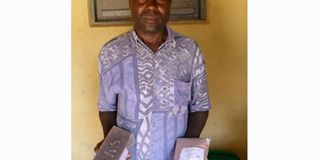Lwengo farmer develops mineral lick and powder from soil that boosts the milk output in cattle

Samuel Kalibbala displays the mineral lick and powder that he makes. PHOTO BY CHRISTINE KATENDE
What you need to know:
There is a traditional method in use but Samuel Kalibbala has made an innovation to improve on that knowledge.
Growing up in a family where his father kept domestic animals like cattle, Mr Samuel Kalibbala did not know that active participation in grazing, treating and watering animals could turn him into an innovator whose works have started attracting recognition and cash.
He says whenever veterinary drugs his father used to buy run out, they would improvise by using local alternatives mainly herbs from forests, to treat the cows.
When he came of age, Mr Kalibbala, a resident of Kamenyamiggo in Lwengo District, did not abandon the family’s cattle-keeping business despite the economic turmoil that affected it in the 1970s and 1980s.
The business limped on amidst uncertainty. The major reason why he kept afloat is his innovation of making mineral blocks for cows.
Work in progress
Kalibbala has become well known among cattle keepers in Lwengo District and greater Masaka area thanks to his Nakasa Mineral Block whose popularity keeps rising.
The mineral lick (block) raises animal’s appetite for water and fodder, which in turn increases milk production. The leak also strengthens the animals’ bones.
On top of the mineral block, under the Nakasa Rural Training for Sustainable Agriculture and Organic Farming, he makes mineral powder that is mixed in chicken feeds like maize bran.
He started his trade about 20 years ago but it was work in progress because of the rudimentary methods he was using. Because of word about his innovations, he was spotted by Prolinnova Uganda, a development-oriented body that promotes local innovations in agriculture and natural resource management.
Prolinnova, whose secretariat is hosted at Environmental Alert, a non-government organisation focuses on supporting indigenous people develop new and better ways of doing things using their own resources and initiative.
“I received training on how to brand and package my block and the mineral powder. I also received money from the agency, which I used to buy a block making machine that has improved my production levels,” he said.
Before the support, Kasibante would manually produce the block, which was not only tiresome but made it difficult to satisfy the demand.
Economical and effective
Red soil is a major raw material in making the block. Kalibbala says he digs about 15 feet in the ground to excavate the type of soil he uses to make the mineral licks.
Some blocks were tested at Makerere University’s Faculty of Veterinary Medicine where it was confirmed that the lick contains calcium, sodium chloride, manganese, phosphorous, copper, selenium cobalt, zinc, iodine and iron to get the required chemical content for enhancing milk production.
Farmers who have used the block have confirmed that milk production has improved by between two to three litres per cow every day.
Dr Nicholas Ssekabunga, the farm manager at Kamenyamiggo District Agricultural Training and Information Centre, says the innovation is not only economical to farmers, but it is effective.
“I have observed that cows have increased milk production and no farmer has complained after using these blocks,” he said.
So, Kalibbala has embarked on patenting it at the Registrar of Companies which process will lead him to the Uganda National Bureau of Standards (UNBS) to be certified. He says the certification from UNBS will make it easy for him to present the products on the open market.
Link with others
His initiative is enhanced by the fact that in May, his products were recognised at the Prolinnova Eastern African Farmers Innovation Fair held in Nairobi, Kenya.
At the fair, which attracted innovators from the Great Lakes region, Kalibbala won the Livestock Production Trophy for his mineral block and powder.
“That fair linked me with innovators from South Africa and Sweden who have expressing interest in working with me to perfect my innovation,” he says.
Each block is sold at Shs4,000. Since there are no veterinary shops in rural Lwengo, farmers have to travel to Masaka, which makes it even more expensive.
Advance innovation
Kalibbala’s challenge is to raise production because many farmers who cannot afford the mineral licks look for a cheaper alternative, which may be not be as good.
Mr Moses Sekate, the coordinator of the project says they have supported and encouraged various innovators to identify, verify and document their ideas in areas like pest control, food processing, energy conservation and human medicine.
“Most of these people have improved on the indigenous knowledge that existed before. These innovations are not scientifically approved yet but the innovators are on course because through exposure, professional scientists are slowly collaborating with them to advance the innovations,” he explains.
Given collaboration with organisations like Kulika Trust as well as the National Agricultural Research Organisation, innovations that have been supported will improve food security and farmers’ incomes.




